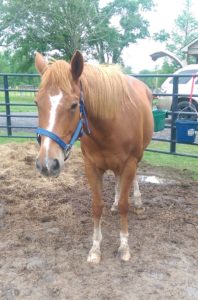Today I’m going to tell you about a Quarter Horse mare named Honey who was sold as a five year old, but after looking at her teeth we determined she was in her early teens. Honey came to my training facility for a month-long tune up so her owner could feel safe about letting his two young boys ride her on their own. She was a very gentle and sweet horse, and in my opinion greatly suited for the job being asked of her. The first photo below was taken the day she arrived. I had Honey at my home for 3 1/2 weeks and didn’t change her feeding habits at all. The only changes that were made were daily riding or exercise, stalling at night and grazing during the day, and, of course, floating her teeth the day she arrived. Now, the second photo was taken the day she left. I know I’m not the only one that can see such a difference in such a short time.
Honey didn’t have a severe dental case–just sharp edges on her upper teeth towards her cheeks and on her lower teeth towards her tongue, and small hooks/ramps on premolars and bottom back teeth. It was a pretty normal case for most horses, and just these little changes enhanced her health and performance remarkably. Before, her owners complained of not being able to back her up, but after a float and installing bit seats Honey backed more than willingly. Today she has a properly balanced mouth and is making those little boys happy! Dental work is oftentimes turned to as a last resort when it should be the first. It may be the answer to problems you didn’t even realize existed.
Dentistry is essential to our fur-babies’ lives and they don’t have to be showing signs of needing dental work for it to benefit them. We can’t expect them to perform and be happy if they aren’t healthy or are in pain. So if you’re an owner, trainer, or just a lover, keep in mind the dental needs of horses. Prevention is always easier than correction.







